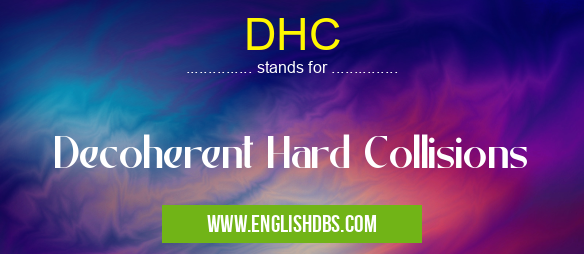What does DHC mean in UNCLASSIFIED
In the field of MISCELLANEOUS, DHC stands for Decoherent Hard Collisions. This phrase is a term used to describe interactions between particles that involves extreme levels of energy transfer. This kind of interaction is often considered a type of “hard collisions” since the involved particles absorb large amounts of kinetic energy, leading to significant changes in their states. Through decoherence, these hard collisions can also lead to wave function collapse and other quantum effects.

DHC meaning in Unclassified in Miscellaneous
DHC mostly used in an acronym Unclassified in Category Miscellaneous that means Decoherent Hard Collisions
Shorthand: DHC,
Full Form: Decoherent Hard Collisions
For more information of "Decoherent Hard Collisions", see the section below.
Explanation
DHC describes interactions between particles that involve high-energy transfer and produce chaotic behavior within the system. These kinds of impacts are generally called “hard collisions” because they cause severe structural changes to the participating particles. As a result, when two particles undergo a DHC, they not only exchange kinetic energy but also cause decoherence—a phenomenon in which the wave functions of multiple quantum systems begin to overlap or become entangled with one another due to extensive interaction. This decoherence can affect both components and have dramatic impacts on their behavior and properties, including their state and momentum vectors. It also has implications for quantum mechanics in general since it provides evidence that particle entanglement can have far-reaching effects; even at great distances apart, certain entangled particles will still reflect each other's states despite their physical separation.
Essential Questions and Answers on Decoherent Hard Collisions in "MISCELLANEOUS»UNFILED"
What are Decoherent Hard Collisions?
Decoherent Hard Collisions (DHC) is a type of nuclear reaction wherein two particles collide at very high speeds and interact according to the laws of quantum mechanics. It results in an interaction with unpredictable outcomes that can produce new subatomic particles.
Where do Decoherent Hard Collisions take place?
DHCs occur naturally in many places, including lightning storms, supernovae, and black holes. They also can be artificially generated in particle accelerators.
What kind of particles are involved in DHC reactions?
Generally speaking, any two particles can undergo this type of reaction; however, some of the most common collisions involve protons and neutrons or electrons and positrons.
How does Decoherent Hard Collision work?
In DHCs, a pair of particles collide at such high energies that their wavefunctions overlap and entangle. This produces unpredictable outcomes as the properties of each particle become entangled upon collision resulting in new particles or energy being released from the interaction.
What are the benefits of studying DHC reactions?
By studying these processes we gain insight into fundamental physics such as quantum chromodynamics (QCD), which governs how quarks interact within protons & neutrons, or quantum electrodynamics (QED), which governs how electrons & photons interact within atoms & molecules. Furthermore, understanding DHCs helps us gain a better understanding of how materials form - from small molecules to great stars!
Are there any risks associated with conducting experiments involving DHCs?
While experimentation with Decoherent Hard Collisions is safe for humans as long as proper safeguards are taken, it poses risks on both environmental and atomic levels. For example, debris from the collisions have been known to damage nearby equipment if not properly handled during cooling procedures. Additionally, depending on the nature of the materials used during experimentation it can result in radioactive waste or other hazardous byproducts being released into the environment if not carefully managed.
Can anyone conduct experiments involving DHCs?
In order to conduct experiments involving Decoherent Hard Collisions one must obtain certain licenses and/or permits depending on their country's regulations regarding nuclear reaction research. Additionally due to cost constraints these kinds of research projects are usually limited to universities and large scale research organizations such as CERN or Brookhaven National Laboratory.
How much energy is typically associated with a DHC reaction?
The amount of energy associated with each individual collision depends on several factors including particle mass & velocity prior to collision along with ambient temperature surrounding the experiment area among other factors; however, usually these types of reactions release somewhere around 200 TeV (teraelectronvolts).
What is being studied when researching DHC interactions?
By conducting experiments using DHC interactions researchers can study topics such as quark-gluon plasma - an extreme form of matter observed within neutron stars & supernova explosions – along with classic ideas related to nuclear physics & thermodynamics such as binding energy & alpha decay processes among others. Additionally they may also glean new insights into our universe’s origin such as where dark matter might be hiding or uncover traces left over from earlier stages in its evolution.
Final Words:
In summary, Decoherent Hard Collisions (DHC) refers to an intense interaction between two or more particles that causes significant energy transfer and induces decoherence within the system as well as possibly between distant entangled particles. This kind of collision is known as "hard" since it significantly alters the state and properties of any particle involved in the event; however, its effects may extend beyond those directly participating in it by virtue of decoherence processes that manifest themselves at larger scales than those normally associated with bare quantized objects such as electrons or photons.
DHC also stands for: |
|
| All stands for DHC |
